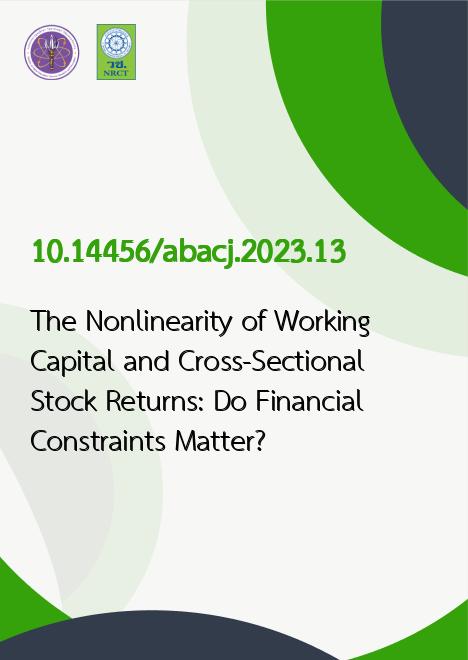
|
The Nonlinearity of Working Capital and Cross-Sectional Stock Returns: Do Financial Constraints Matter? |
|---|---|
| รหัสดีโอไอ | |
| Creator | Khoa Dang Duong |
| Title | The Nonlinearity of Working Capital and Cross-Sectional Stock Returns: Do Financial Constraints Matter? |
| Contributor | Linh Thi Diem Truong, Tran Ngoc Huynh, and Ha Pham |
| Publisher | Assumption University |
| Publication Year | 2566 |
| Journal Title | ABAC Journal |
| Journal Vol. | 43 |
| Journal No. | 2 |
| Page no. | 26-41 |
| Keyword | working capital, cross-sectional stock returns, non-linear, arbitrary profits, Covid-19 |
| URL Website | www.abacjournal.au.edu |
| Website title | ABAC JOURNAL |
| ISSN | 0858-0855 |
| Abstract | This study is the first to examine the impacts of working capital (WC) and financial constraints on cross-sectional stock returns in Taiwan. The findings indicate a non-linear relationship between WC and stock returns. Moreover, the nonlinearity between WC and cross-sectional stock returns is robust after controlling for financial constraints, risk, and growth factors, before the Covid-19 pandemic. In contrast, there is no evidence of nonlinearity between WC and stock returns throughout the Covid-19 outbreak. In addition, the study shows that any deviations from the minimum WC level enhance the stock returns cross-sectionally. It is found that a positive Deviation effect exists in the Taiwan stock exchange before the Covid-19 pandemic by employing portfolio sorting methodologies. The return difference of the long buying highest Deviation and short selling lowest Deviation portfolios earn from 0.6% to 0.9% per month after controlling for financial constraints, risks, and growth factors. Interestingly, it is determined that the deviation effect becomes negative for small stocks during the Covid-19 pandemic, implying that investors prefer small stocks to maintain minimum working capital. The results support the trade-off theory and liquidity preference theory. Finally, the study provides insights into working capital management for managers, and investment strategies for investors during the pandemic. |